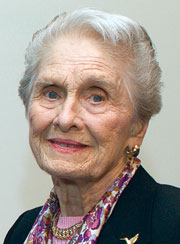In Memoriam
Marion Smith Sivright, AA ’49
Sept. 29, 2008
Winnetka, Ill.
John Puzzini, BS ’50
March 12, 2009
Laurel, Md.
Seymour Berry, BA ’51, JD ’53
Dec. 6, 2008
Silver Spring, Md.
F. Richard Malzone, BS ’53, JD ’60
Oct. 10, 2008
Bowie, Md.
Mary Mann, AA ’53
Nov. 27, 2008
Fairway, Kan.
James D. O’Neal, BA ’53, MA ’58
Nov. 1, 2008
Fort Belvoir, Va.
Nicholas V. Prencipe, MA ’56
Aug. 29, 2008
Manteo, N.C.
Patricia Anne Young, BA ’56
Nov. 26, 2008
Potomac, Md.
John Manning, BSE ’57, JD ’61
Aug. 16, 2008
Arlington, Va.
William E. Lavery, MA ’59
Feb. 16, 2009
Blacksburg, Va.
Michael B. Spevak, BA ’61
Nov. 20, 2008
Washington, D.C.
Milton Tenenbaum, MS ’66
July 9, 2008
Arlington, Va.
Margaret M. Reuss, PhD ’69
Sept. 30, 2008
Chicago
Edith Rubin, BS ’71
Aug. 15, 2008
Chevy Chase, Md.
Rupert R. Strickland, MA ’76
Sept. 26, 2008
Washington, D.C.
John E. Horton, MA ’78
Oct. 28, 2008
Columbus, Ohio
Alan M. Scherr, MFA ’88
Nov. 26, 2008
Faber, Va.
Brian Adkins, BA ’05, MA ’07
Jan. 31, 2009
Columbus, Ohio
Seth A. Woolf, BA ’07
July 15, 2008
Sarasota, Fla.
Cornelius Bennhold
Cornelius Bennhold, professor of physics and former chair of the Department of Physics, died April 22 after a long struggle with cancer. He was 48.
Bennhold, a theoretical nuclear physicist, came to GW in 1992. His research gained support from the U.S. Department of Energy and the National Science Foundation and led to the understanding of several fundamental aspects of the structure of matter. Bennhold became a widely recognized expert in the physics of few-body nuclei and in hypernuclear physics. He also developed a coupled-channels approach to nucleon resonances.
An innovative teacher and influential scientist, Bennhold published more than 100 papers and gave more than 100 invited talks. GW recognized his accomplishments with the Trachtenberg Award for Faculty Scholarship and two separate teaching prizes in 1995 and 2007.
In addition to serving on many college committees, Bennhold was deputy chair and then chair of the Department of Physics from 2004 to 2008.
Katherine Elizabeth Burtner
Katherine Elizabeth Burtner, a former GW dance professor, died of pancreatic cancer Feb. 4 in Greer, S.C., at the age of 102.
Burtner, known as “Betz,” taught modern dance at the University from 1937 through the early 1970s and was instrumental in establishing the dance MA program in 1964 and BA program in 1965.
Burtner was influential in bringing many of the early founders of modern dance to Washington, D.C., in the formative years when modern dance was a “fringe” genre. She established Dance Production Group (now Dance Performance Project), in which students handle technical work for productions and concerts in dance, and she also organized a special collection documenting GW dance, which is now catalogued at Gelman Library.
“She believed in dance as an art,” says Maida Withers, GW professor of dance. “And she worked tirelessly to develop respected dance programs at the university level when few institutions offered such programs.”
 Evelyn E. “Betty” Elliott
Evelyn E. “Betty” Elliott
Evelyn E. “Betty” Elliott
Evelyn E. “Betty” Elliott, wife of GW President Emeritus Lloyd Hartman Elliott, died Jan. 22 at the
age of 91.
Longstanding supporters of the University, the Elliotts created the Evelyn E. and Lloyd H. Elliott Fund, an endowment in support of the Gaston Sigur Professorship and other activities at GW’s Elliott School of International Affairs, which was named for the Elliotts in 1988.
Lloyd Hartman Elliott served as GW’s 14th president from 1965 to 1988. During his tenure, he oversaw the construction of the Gelman Library, the Jacob Burns Law Library, the Paul Himmelfarb Health Sciences Library, the Academic Center, Theodore N. Lerner Hall, and the Cloyd Heck Marvin Center.
James R. Millar
James R. Millar, who directed GW’s Institute for European, Russian, and Eurasian Studies (1989-2001) and served as associate dean (1989-95) and interim dean (1994) of the Elliott School, died Nov. 30 after battling pancreatic cancer.
Millar, 72, was also professor of economics and international affairs from 1989 until 2004, after which he became professor emeritus. Even into his 70s, he continued to report to his office at the institute every day.
Millar wrote several books and articles. Two in particular, The Soviet Rural Community (University of Illinois Press, 1971), and Politics, Work and Daily Life in the USSR (Cambridge University Press, 1987), are considered classics in the field.
“Jim was a tremendous positive influence in the lives of many people at GW, across the country, and around the world,” says Hope M. Harrison, the director of GW’s Institute for European, Russian, and Eurasian Studies.
George Steiner
George Steiner, 90, founder of GW’s Department of Music and professor emeritus, died Dec. 29.
In 1960, Steiner joined the faculty of GW, where he instituted the University’s first-ever music department. He established undergraduate and graduate degree programs, built a substantial faculty, successfully applied for accreditation by the National Association of the Schools of Music, and guided the design of a music facility in the Academic Center.
GW’s Steiner Music Scholarship was named in his honor. In addition to his role at GW, Steiner served as conductor of the Washington Camerata Orchestra, the Friday Morning Music Club Orchestra, and the Alexandria Symphony.

